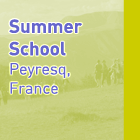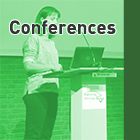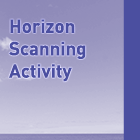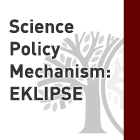◄A► 2011 ALTER-Net Summer School: some reflections
We have just concluded the sixth ALTER-Net Summer School in Peyresq, Alpes de Haute Provence, France. Thirty-one students, about 20 speakers and our team of tutors and conveners experienced another (as one participant referred to it) “intellectual pressure cooker”, developing and testing ideas about new assessments of ecosystems and what they mean for people on this planet.
The ALTER-Net Summer School: an “intellectual pressure cooker”
The intensity of these schools has always been breathtaking. Upon arrival, everyone gathers on the terrace and gives a brief outline of their expectations, which often are far apart from each other, but which always indicate just how intensively the selected students have contemplated the human-caused biodiversity crisis and its impacts on humanity itself. The next day, everyone presents a poster of his/her own research – another intensive event as everyone tries to understand what kind of people are going to be one's company in this tiny village during the coming ten days.
The theme “biodiversity and ecosystem services” is then introduced with some talks, and the atmosphere is soon established: questions are allowed any time, and talks are intended to encourage debate. A key emerging property of the school over the years has been that speakers (all of them very well established people in the field) considerably re-think their own ideas before presenting them. In several cases, this has triggered new ideas to be born, simply out of the exchange between people that often continues during breaks and meals.
Working groups are formed to generate another mechanism to test the concepts presented. The idea there is to understand the actual meaning of ecosystems and the services they provide for different stakeholders in a given region, and to synthesise them. After an afternoon's work, everyone gets together and listens to yet another talk, intended to be thought-refreshing and often about a rather different topic.
This goes on for a few days; as a way of avoiding too linear thinking we then make a field trip which takes us down from the Alps to the lower lands of Provence to study the processes of land use change: in the lavender fields of the Plateau de Valensole, on the beach of the “tourist machine” Lac de St. Croix, and in the gorges of the Verdon.
After the school, many Peyresq participants become members of a global “alumni network” that now comprises about 340 people (participants, speakers, conveners included). Looking at this list of names and addresses indicates that an idea seems to have found a substrate to grow upon. What is this idea, and how has it evolved?
Many Peyresq participants become members of a global “alumni network” that now comprises about 340 people
About 10 years ago, the idea of quantifying the importance of ecosystem functioning for people was not widely accepted – certainly not in the conservation community – but it was slowly gaining momentum in some interdisciplinary communities concerned with trade-offs between different social actors who depend on intact ecosystems. To bring this idea into a training situation was the key concept of a concerted action, funded by the European Commission (Integrated Assessment of Vulnerable Ecosystems under Global Change – AVEC). Rik Leemans (Wageningen, The Netherlands) was one of its co-founders. In AVEC, we developed the basic summer school idea and successfully implemented it in 2003 and 2005, just in time for the arrival of the much larger Network of Excellence ALTER-Net on the European scene. ALTER-Net allowed us to continue and further develop the main ideas, and it provided the basis for yearly events – 2011 was the sixth of these (Rik's place having been taken halfway through by Allan Watt).
The impact of the Peyresq “pressure cooker” on ALTER-Net itself may be subject to different opinions. We think we have observed a considerable change of thinking in the community, leading to more openness for the idea of quantifiable ecosystem services than existed in 2001, and more generally to a better understanding across disciplinary boundaries such as that between ecologists and economists. This “mainstreaming” is obviously a global process and only in some part, perhaps, driven by debates in the small Peyresq seminar room. But the yearly discussions about future schools and their contents have probably caused reflection also among people not directly involved, just as the interactions between alumni and their respective communities undoubtedly have.
We think we have observed a considerable change of thinking in the [ALTER-Net] community, leading to more openness for the idea of quantifiable ecosystem services than existed in 2001, and more generally to a better understanding across disciplinary boundaries such as that between ecologists and economists
2011 is the year where the Potsdam Institute for Climate Impact Research (PIK) ends its involvement. Sabine Lütkemeier, the geologist who had been a key figure in both management and outreach of German global change research prior to ALTER-Net, has been summer school director of operations for 8 years and moves on to well-deserved retirement. Wolfgang Cramer has already left PIK and takes up leadership of a new CNRS biodiversity lab in Aix-en-Provence and Marseille.
As conveners of the AVEC and ALTER-Net summer schools over the last eight years, we sincerely hope that whoever takes responsibility for organising, convening and tutoring the students through future summer schools will maintain their innovative and challenging spirit. Doing so would be a fine demonstration of ALTER-Net's unbroken commitment to training the next generation of scientists. It would also pay tribute to the substantial support we have enjoyed from the Belgian charity Foyer d'Humanisme, its president Mady Smets, as well as from the local Peyresq staff who have been magnificent helpers in an activity of global importance.
- Wolfgang Cramer, Institut Méditerranéen d'Ecologie et de Paléoécologie (IMEP), Aix-en-Provence, France
- Uta Fritsch, European Academy of Bozen, Italy
- Sabine Lütkemeier, Potsdam Institute for Climate Impact Research, Potsdam, Germany
- Allan Watt, Centre for Ecology & Hydrology, Edinburgh, United Kingdom
Details of past ALTER-Net Summer Schools are available here.
Have you attended an ALTER-Net Summer School?
|












 Students and tutors of past Summer Schools may wish to join our ALTER-Net Summer School Alumni group on LinkedIn
Students and tutors of past Summer Schools may wish to join our ALTER-Net Summer School Alumni group on LinkedIn